Did you know that searches for “dry hair remedies” increase by over 60% every winter on Google? It’s because chilly winds, low humidity, and indoor heating gently take away your hair’s natural moisture, leaving it dull, frizzy, and lifeless.
We eagerly await the arrival of the chilly winter breeze and sunny days to enjoy. But, when winter comes, that cold air often surprises us by hitting our skin and making our hair look less lively. Don’t worry, there are ways to care for yourself during this season. You can enjoy winter while keeping your hair and skin healthy and beautiful.
To help you enjoy your winter adventures without months of trouble, check out these common winter hair problems and discover the best solutions. Keep exploring to learn simple ways to handle winter hair concerns effortlessly.
Why Winter Feels Like a Bad Hair Season?
Winter can be cosy, but it can also be harsh on your hair. The chilly, dry air removes moisture from your hair, leaving it prone to breakage, frizz, and static. Indoor warmth can worsen dryness, and reduced scalp oil can lead to dryness, itchiness, and dandruff. The mix of environmental stress and reduced natural oils can make hair look damaged and hard to manage. That’s why winter often feels like a constant balancing act between staying warm and keeping your hair healthy.
Common Winter Hair Problems With Solutions!
Cold winds, cosy sweaters, and frizzy hair? Winter can feel magical, but your hair might not agree! Let’s look at the top winter hair problems and simple ways to fix them, so you can enjoy the season with your hair looking fabulous.
Dry and Itchy Scalp
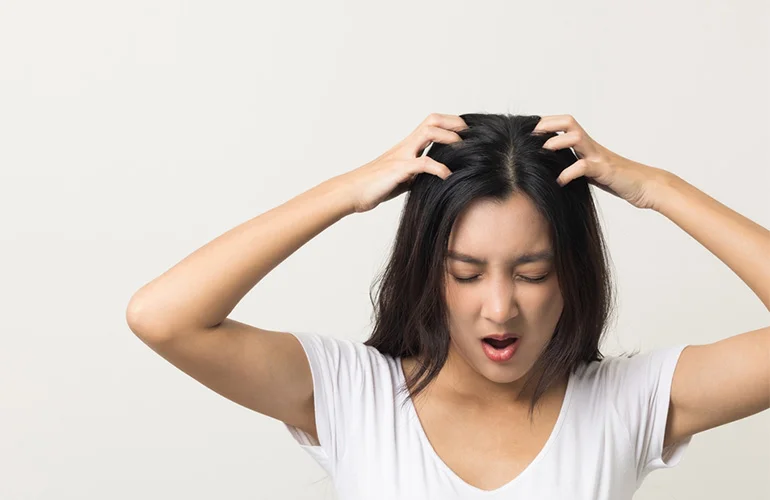
It’s essential to care for your scalp during cold winds and low humidity, as these conditions can significantly affect it by causing moisture loss. This can lead to a dry, tight, and itchy scalp, which may worsen dandruff.
Treatment for Dry and Itchy Hair
- Apply warm tea tree or coconut oil to your scalp twice weekly to rehydrate and calm itchiness.
- Use a mild, sulfate-free shampoo that contains hydrating ingredients such as aloe vera or glycerin.
- Use aloe vera gel or apple cider vinegar to rinse your scalp weekly, helping to balance pH levels and reduce flaking.
- Stay hydrated and eat omega-3-rich foods to nourish your scalp.
The Static Frizz Look
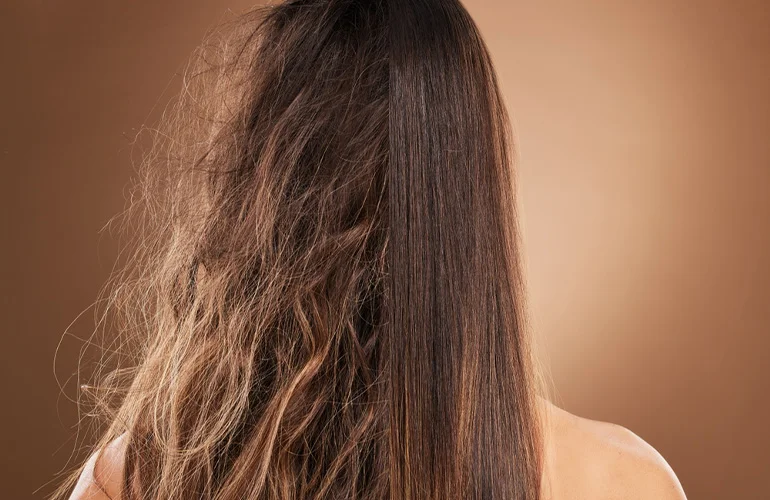
During winter, the air tends to be dry and less humid. This can cause your hair to lose moisture and develop static electricity, especially when your hair rubs against woolly items like scarves or hats. This can cause flyaways and frizz, making it impossible for hair to stay neatly in place.
Treatment for Frizzy Hair
- Apply a conditioner or hair serum to maintain moisture and minimise static.
- Opt for a wooden or anti-static comb instead of plastic to avoid static buildup.
- Pat dry your hair with a microfiber towel to avoid friction and breakage.
- Avoid excessive brushing and steer clear of synthetic fabrics that generate more static.
Hat Hair: Flat and Lifeless

As the weather cools, we look forward to wearing our cute beanies, but dealing with hat hair afterwards is less enjoyable. While they keep us warm and make our mornings easier, hats can leave our hair flat and dull and even cause damage.
Treatment for Hat Hair
- Line your hat with silk or satin fabric to minimise friction and avoid static buildup.
- Apply a lightweight dry shampoo before wearing your hat to absorb excess oil and maintain hair freshness.
- Opt for hats with a slightly loose fit to ensure your scalp can breathe comfortably.
- Flip your hair upside down and blow-dry for 10 seconds after removing your hat to restore volume instantly.
Dandruff Disaster
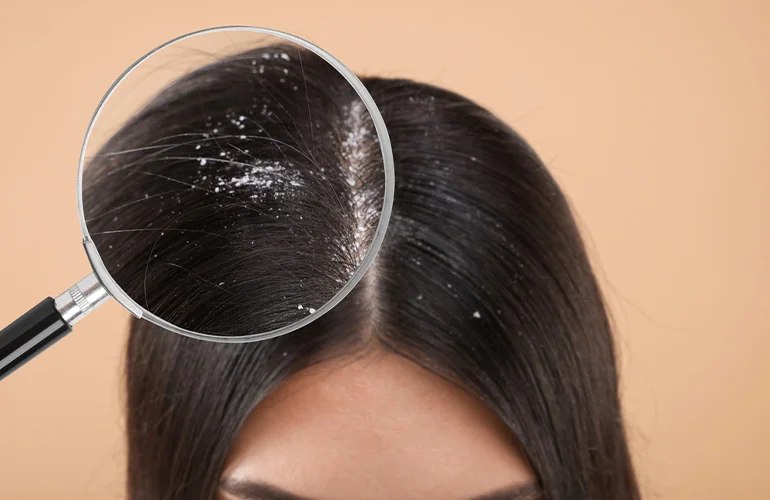
Cold winter air and low humidity can dry out your scalp, leading to itchiness and white flakes. Indoor heating worsens this problem by removing natural oils from the scalp, which can lead to dandruff and dull hair.
Treatment for Dandruff
- Apply tea tree or coconut oil to your scalp before washing to replenish moisture and combat flakes.
- Use an anti-dandruff shampoo with either zinc pyrithione or ketoconazole twice weekly.
- Use lukewarm water instead of hot water to help prevent scalp dryness.
- Stay hydrated and eat zinc-rich foods, such as nuts and seeds, to support scalp health.
The Horror Hair Fall
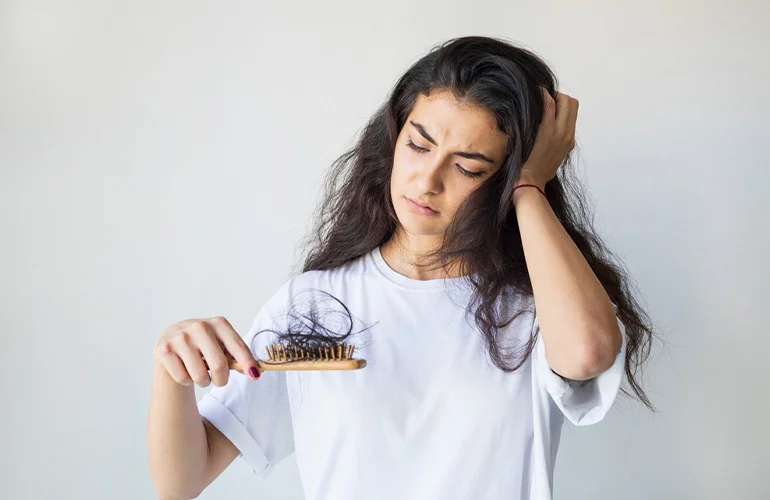
Several factors can cause hair fall during winter. The dry air and low humidity weaken hair roots and reduce scalp blood circulation. Indoor heating and wool hats can also make your scalp greasy, clog pores, and increase hair fall. Poor nutrition and less sunlight (vitamin D deficiency) worsen the problem, leaving your hair thin, flat, and dull.
Treatment for Hair Fall
- Massage your scalp twice a week with warm castor or onion oil to reinforce roots and boost blood flow.
- Consume foods high in protein, such as eggs, spinach, and nuts, to support hair growth internally.
- Avoid washing your hair too frequently, as it removes natural oils that shield your scalp.
- Apply a gentle sulfate-free shampoo, then finish with a nourishing conditioner.
- Spend a few minutes each day in sunlight to support healthy vitamin D levels.
Split Ends and Breakage
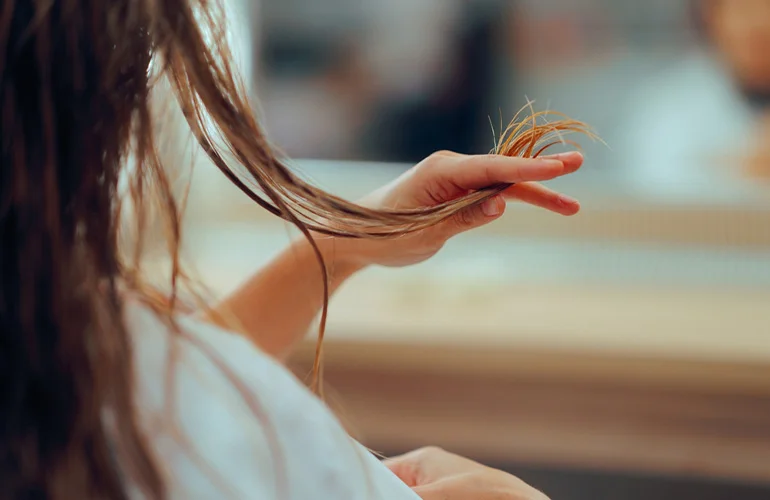
Blow-dryer-induced split ends and flyaways result from dehydration and damage. While this can happen year-round, the low humidity in winter makes hair more prone to drying out and becoming brittle.
Treatments for Split Ends and Breakage
- Get your hair trimmed every 6 - 8 weeks to remove split or damaged ends.
- Use a conditioner or hair serum to lock in moisture and safeguard the tips.
- Whenever possible, avoid heat styling and air-dry your hair.
- Use a microfiber towel to softly dry your hair, reducing the risk of breakage.
Dull Hair
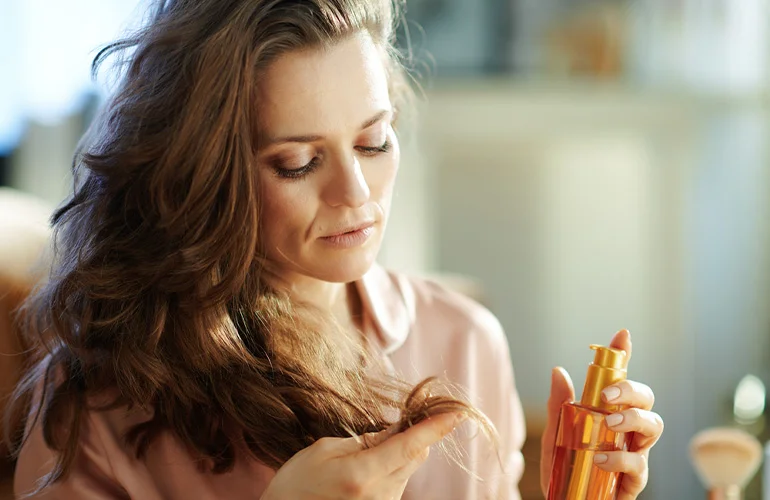
Cold winds, low humidity, and product buildup can cause your hair to lose its natural shine. During winter, reduced scalp oil production leads to dryness and a dull appearance. Additionally, heat styling and indoor heating further deplete your hair's natural lustre.
Treatment for Dull Hair
- Use apple cider vinegar to rinse your hair weekly to help eliminate buildup and enhance shine.
- Use a DIY mask made of banana and honey, or yoghurt and olive oil, for deep nourishment.
- Finish your wash with a cold-water rinse to close cuticles and boost shine.
- Avoid overwashing your hair and apply a light serum to boost softness and shine.
Winter Hair Care Routine for Winters That Actually Works!
Good hair days in winter are possible. All you need is the proper haircare routine. Here’s a simple weekly routine to help your hair stay healthy and happy during the colder months:
Day 1: Enjoy a relaxing oil massage paired with a gentle shampoo for a soothing experience.
Day 2: Try using a conditioner or serum to give your hair that extra boost of moisture and shine.
Day 3: Enjoy your relaxing time today. Kindly note that there will be no head washing today.
Day 4: Treat your hair with a nourishing deep conditioning or hair mask for a healthier, more radiant look.
Day 5: Gentle detangling paired with a soothing scalp massage.
Day 6: Rinse with cool water or try an herbal rinse for a soothing experience.
Day 7: Remember to take time to rest and stay hydrated by drinking plenty of water and enjoying nutritious meals.
Pro Tip: Use a humidifier indoors to maintain balanced humidity levels. It’s great for your hair and skin, and it can even improve your sleep quality!
Best Natural Ingredients for Winter Hair Care: Home Remedies
Looking for simple, chemical-free ways to care for your hair this winter? Try these potent natural ingredients that deeply nourish and protect your hair. Some of them are:
| Ingredient | Benefits | How To Use |
|---|---|---|
| Aloe Vera | It soothes the scalp and hydrates hair. | Mix it with coconut oil as a mask. |
| Argan Oil | It adds shine to the hair and reduces frizz. | Apply 2–3 drops post-shower. |
| Castor Oil | It promotes hair growth and makes hair thicker. | Try massaging this oil into your hair twice a week. |
| Honey | It is a natural humectant that adds softness to your hair. | Mix in DIY hair masks into your routine. |
| Yogurt | It reduces dandruff and adds moisture to your hair. | Apply for 20 minutes before washing your head. |
Trending: Did you know that 'Aloe vera hair mask for dry scalp” is one of the most popular winter hair care remedies searched in India?
Your Winter Hair Story Starts With Self-Care!
Winter weather can sometimes be harsh on your hair, but with a bit of care, your hair can stay soft, shiny, and full of life. Gentle practices like oiling your scalp and a nutrient-rich diet can make a big difference in your hair's health and glow.
Just like you take care of your hair from the harsh winter chill, remember to look after your overall health too. Having a comprehensive health insurance plan provides peace of mind in the event of unforeseen health issues, allowing you to focus on what really matters: your health and happiness. Keep yourself hydrated, nourish your body, and look after your health. When you feel good and healthy, your confidence shines through in every part of you, even in your hair.
Disclaimer: The above information is for reference purposes only. Kindly consult your general physician for verified medical advice. Health insurance benefits are subject to policy terms and conditions. See policy documents for details.
